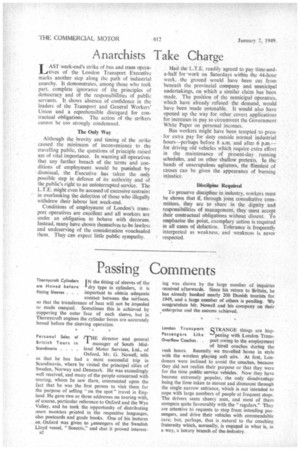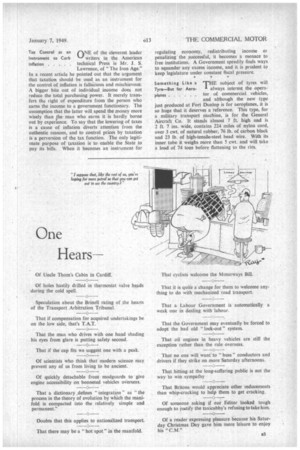Passing Comments
Page 28

Page 29

If you've noticed an error in this article please click here to report it so we can fix it.
Thernyeroft Cylinders IN the fitting of sleeves of the are Honed before 'dry type in cylinders, it is Fitting Sleeves . . . important to obtain adequate
contact between the surfaces, so that the transference of heat will not be impeded or made unequal. Sometimes this is achieved by coppering the outer face of each sleeve, but in Thornycroft engines the cylinder bores are accurately honed before the sleeving operation.
Personal Sales of (THE director and general British Tours in A manager of South MidScandinavia . . . _ land Motor Services, Ltd., of Oxford, Mr. G. Nowell, tells us that he has had a most successful trip in Scandinavia, where he visited the principal cities of Sweden, Norway and Denmark. He was exceedingly well received, and many of the people concerned with touring, whom he saw there, commented upon the fact that he was the first person to visit them for the purpose of selling " on the spot" travel in England. He gave two or three addresses on touring with, of course, particular reference to Oxford and the Wye Valley, and he took the opportunity of distributing 'ours 000klets printed in the respective languages, also postcards and guide books. One of his lectures ow-Oxford was given to passengers of the Swedish Lloyd vessel, "Sueccia," and that it proved interest
n2
ing was shown by the large number of inquiries received afterwards. Since his return to Britain, he has already booked nearly 200 Danish tourists for 1949, and a large number of others is pending. We congratulate Mr. Nowell and his company on their enterprise and the success achieved.
London Transport STRANGE things are hapPassengers Like `--ipennig with London TransOverflow Coaches. . port owing to the employment
of hired coaches during the rush hours. Recently we travelled home in style with the wireless playing soft airs. At first, Londoners were inclined to avoid the coaches, because they did not realize their purpose or that they were for the time public service vehicles. Now they have become extremely popular, the only disadvantage being the time taken to mount and dismount through the single narrow entrance, which is not intended to cope with large numbers of people at frequent stops. The drivers seem cheery men, and most of them compare quite favourably with the "regulars." They are attentive to requests to stop from intending passengers, and drive their vehicles with commendable care; but, perhaps, that is natural to the coaching fraternity which, normally, is engaged in what is, in a way, a luxury branch of the industry.
Tax Control as an ('NE of the cleverest leader Instrument to Curb writers in the American Inflation technical Press is Mr. J. S.
Lawrence, of "The Iron Age." In a recent article he pointed out that the argument that taxation should be used as an instrument for the control of inflation is fallacious and mischievous. A bigger bite out of individual income does not reduce the total purchasing power. It merely transfers the right of expenditure from the person who earns the income to a government functionary. The assumption that the latter will spend the money more wisely than the man who earns it is hardly borne out by experience. To say that the lowering of taxes is a cause of inflation diverts attention from the authentic reasons, and to control prices by taxation is a perversion of the tax function. The only legitimate purpose of taxation is to enable the State to pay its bills. When it becomes an instrument for regulating economy, redistributing income oi penalizing the successful, it becomes a menace to free institutions. A Government speedily finds ways to squander any excess income, and it is prudent to keep legislature under constant fiscal pressure.
Something Like a THE subject of tyres will Tyre—But for AeroI always interest the opera planes . . tor of commercial vehicles,
and although the new type just produced at Fort Dunlop is for aeroplanes, it is so huge that it deserves a reference. This type, for a military transport machine, is for the General Aircraft Co. It stands almost 7 ft. high and is 2 ft. 7 ins, wide, contains 224 miles of nylon cord, over 3 cwt. of natural rubber, 76 lb. of carbon black and 23 lb. of high-tensile-steel bead wire. With its inner tube it weighs more than 5 cwt. and will take a load of 74 tons before flattening to the rim.




















































































